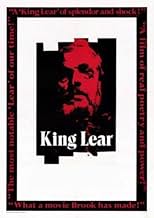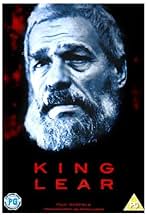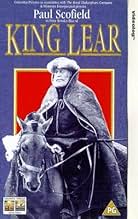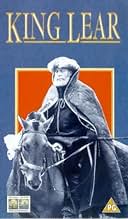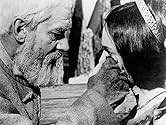Aggiungi una trama nella tua linguaKing Lear divides his kingdom among his daughters, giving great importance to their protestations of love for him. When Cordelia refuses to idly flatter the old man, he banishes her and turn... Leggi tuttoKing Lear divides his kingdom among his daughters, giving great importance to their protestations of love for him. When Cordelia refuses to idly flatter the old man, he banishes her and turns for support to his remaining daughters.King Lear divides his kingdom among his daughters, giving great importance to their protestations of love for him. When Cordelia refuses to idly flatter the old man, he banishes her and turns for support to his remaining daughters.
- Regia
- Sceneggiatura
- Star
- Premi
- 2 vittorie e 1 candidatura in totale
Recensioni in evidenza
Much reviled at the time of it's release, this heavily cut, Danish
co-production horrified critics with it's bleak as possible take on what
some consider the world's greatest play.
Obviously influenced by nortic flicks from Dryer to Bergman,
Peter Brook shot this as a midevil horror show; and Pauline Kael called
it his "Night Of The Living Dead."
While certainly unfair to the scope of the Bard's vision, the
film is undeniably facinating; though sometimes tedious too. In the best
parts it comes alive with a vivid wickedness, you can certainly see how
Lear's daughter's came to hate his guts!
So, even if it does mutilate a classic, this film is pretty
amazing and highly recommendable. A dark product of it's own time, you
will scarcely see a Lear like this again.
co-production horrified critics with it's bleak as possible take on what
some consider the world's greatest play.
Obviously influenced by nortic flicks from Dryer to Bergman,
Peter Brook shot this as a midevil horror show; and Pauline Kael called
it his "Night Of The Living Dead."
While certainly unfair to the scope of the Bard's vision, the
film is undeniably facinating; though sometimes tedious too. In the best
parts it comes alive with a vivid wickedness, you can certainly see how
Lear's daughter's came to hate his guts!
So, even if it does mutilate a classic, this film is pretty
amazing and highly recommendable. A dark product of it's own time, you
will scarcely see a Lear like this again.
As has happened so many times with the Oscars, another great film-actor-ensemble has been neglected. Recognised nearly universally as the ultimate test of an actor's craft, Paul Scofield as Lear in this 1971 version could be deified for his performance, even more complex than his Oscar-winning Thomas More in 1966's best pic "A Man For All Seasons". Viewing this film should be a prerequisite not just for R.A.D.A. acting students. Incorporating as he did the essence of Lear so organically, Scofield sadly was not even nominated, another nod to the lowest common denominator public taste. This review, nearly forty years after the pic's release, was an on-the-spot spontaneous impulse after yet another viewing of the film. People are afraid of Shakespeare(a.l.a. DeVere); don't be. All, but especially any pained by their own offspring, will turn away from the screen with much more than a penny's worth of thought and a rediscovery of the art of Paul Scofield and ensemble. It is a cliché, but they just don't make movies like this one anymore.
I have read altogether too many reviews of this film which bash it all to hell because the reviewer doesn't agree with Brook's reading of KING LEAR. To all such folk I would like to say: We Shakespeare fans should positively glory in the fact that every reader (and a fortiori every director) has his or her own interpretation of all the plays. Given Brook's interpretation, the film is wonderful.
This version of Shakespeare's greatest tragedy is not only consistent with itself, which most aren't, it is acted to a hilt. The characters are brilliantly portrayed. The interactions between them appear as the absolute and utter epitome of conflict and love, of the heroic and villainous way people act when confronted with a situation that is calculated to freak a human being out.
My favorite characterization is that of the Fool, who utterly steals the show and who becomes almost a Greek chorus. The way he interacts with Lear suggests a metaphysical mood of "We know exactly what's going on here, don't we?" The understanding between these two is too deep to be expressed in normal language; in the conversation around "The reason why the seven stars are only seven" (which would have struck any of the other characters, except maybe Kent, as a demented sequence of non sequiturs) suggests that Lear knows, at least at that moment, how the story will turn out, and that his attitude is one of "what is't to leave betimes? Let be." The Fool is here a prophet of absurdity, a Dark Age cross between a Marx Brother and Lenny Bruce.
And I challenge anyone to show me any actors who could do Kent and Gloucester better than those who portrayed them in this film. To say nothing of the wonderful job Scofield does with the title role.
Brook's Lear is almost sociopathically unfeeling until disaster begins to overtake him. To be sure, this view of Lear is not mine. But again, Shakespeare's characters are topics inexhaustible, and there is no such thing as a Lear to end all Lears. Whether one agrees with Brook or not, he carries his idiosyncratic reading off brilliantly---just as brilliantly as Laurence Olivier and Ian Holm in their utterly un-Brookish TV versions. I say: Let it ride! Let's have as many defensible and indefensible Lears as possible, and let's have them as utterly contradictory of each other as the 1945 and 1991 film versions of Henry the Fifth are.
By the way, I am a recent convert to this position. Before I saw the light, I was (for example) utterly ticked off at Kenneth Branagh's film of HAMLET, because it portrayed the Prince as having had sex with Ophelia way back when, and because its Fortinbras was an uncultured creep who dissed Hamlet by tearing down his father's monument. Wasn't it obvious that the text utterly contradicts both notions? Yep! But Branagh would have every right to say to me, "The hell with you, go make your own film." And so would Brook to his critics.
See it, friend. I look forward to our friendly argument.
This version of Shakespeare's greatest tragedy is not only consistent with itself, which most aren't, it is acted to a hilt. The characters are brilliantly portrayed. The interactions between them appear as the absolute and utter epitome of conflict and love, of the heroic and villainous way people act when confronted with a situation that is calculated to freak a human being out.
My favorite characterization is that of the Fool, who utterly steals the show and who becomes almost a Greek chorus. The way he interacts with Lear suggests a metaphysical mood of "We know exactly what's going on here, don't we?" The understanding between these two is too deep to be expressed in normal language; in the conversation around "The reason why the seven stars are only seven" (which would have struck any of the other characters, except maybe Kent, as a demented sequence of non sequiturs) suggests that Lear knows, at least at that moment, how the story will turn out, and that his attitude is one of "what is't to leave betimes? Let be." The Fool is here a prophet of absurdity, a Dark Age cross between a Marx Brother and Lenny Bruce.
And I challenge anyone to show me any actors who could do Kent and Gloucester better than those who portrayed them in this film. To say nothing of the wonderful job Scofield does with the title role.
Brook's Lear is almost sociopathically unfeeling until disaster begins to overtake him. To be sure, this view of Lear is not mine. But again, Shakespeare's characters are topics inexhaustible, and there is no such thing as a Lear to end all Lears. Whether one agrees with Brook or not, he carries his idiosyncratic reading off brilliantly---just as brilliantly as Laurence Olivier and Ian Holm in their utterly un-Brookish TV versions. I say: Let it ride! Let's have as many defensible and indefensible Lears as possible, and let's have them as utterly contradictory of each other as the 1945 and 1991 film versions of Henry the Fifth are.
By the way, I am a recent convert to this position. Before I saw the light, I was (for example) utterly ticked off at Kenneth Branagh's film of HAMLET, because it portrayed the Prince as having had sex with Ophelia way back when, and because its Fortinbras was an uncultured creep who dissed Hamlet by tearing down his father's monument. Wasn't it obvious that the text utterly contradicts both notions? Yep! But Branagh would have every right to say to me, "The hell with you, go make your own film." And so would Brook to his critics.
See it, friend. I look forward to our friendly argument.
Peter Brook's film is a very bleak and barbaric interpretation of King Lear. He does a great job directing and whilst some of his experimentation doesn't pay off (such as very strange zooming with Kent at the beginning), when it does pay off it is fantastic (such as Lear's monologues)
What's good: Alan Webb's Gloucester and Jack MacGowran's Fool both threaten to steal the picture. Webb is immensely touching in his attempted suicide, but then, I have trouble thinking of a bad Gloucester. Cyril Cusack as Albany and Tom Fleming as Kent should also be praised, and Patrick Magee is creepy as ever as Cornwall.
Henning Kristiansen's cinematography is stunning, rendering Jutland in winter the most inhospitable Learscape ever, and this is the same fellow who shot the lush "Babette's Feast" in the same general location! When Lear and friends are outside being battered by the storm, we see the ungrateful villains inside basking in the warmth of a gigantic roaring fireplace. The visual contrast has never been greater. When Poor Tom's cold, he's really cold in real snow, not just clasping himself and shivering on cue.
Peter Brook's productions often involve wholesale cuts and rearrangements, plus hefty doses of non-authorial content. Yes, this Lear is cut to the bone, the style owes much to Bergman, Beckett, Brecht, etc.
The criminal waste is that Paul Scofield was a major Lear of his generation, and it's gutted here. His magnificent voice is thinned out to a thread, and much of the time the character is distant, veiled and under-energized. His disintegration arouses pity, but no audience involvement. We watch him die from a million miles away, and lose more than we gain with this application of alienation technique.
By the same token, Irene Worth's whispered Goneril is not the volcano we want. For example, she is incapable of expressing lust for Edmund, and that's a crucial omission, not in the text, but in the performance. Two fine actors are caught at considerably less than their best, giving the director what he wanted.
The energy level all around is a bit low, which kills much of what remains of Shakespeare's language, but what really hurts is the leaden pace. Considering half the play is missing, we start slowly, and after Gloucester hits the beach, grind to a complete halt. Entropy is total. Even with the text gutted and filleted, the last half hour of the film feels longer than many complete plays.
For DVD versions with complete texts, don't overlook Jonathan Miller's neurologically-informed production for the BBC with Michael Hordern and Brenda Blethyn. The more mainstream, star-studded Olivier video is an automatic choice for many.
However, another abbreviated version directed by Peter Brook features perhaps the best reading of Shakespeare's Lear of them all, from Orson Welles. This 90-minute condensation from the early days of live television also features Alan Badel, Beatrice Straight and Micheal MacLiammoir. First you must get past the resourceful but limited visuals, two cameras in a single studio running the whole play live without a break. The reward is that no one, no one does Lear's poetry more clearly, simply, powerfully and beautifully than Orson Welles.
Henning Kristiansen's cinematography is stunning, rendering Jutland in winter the most inhospitable Learscape ever, and this is the same fellow who shot the lush "Babette's Feast" in the same general location! When Lear and friends are outside being battered by the storm, we see the ungrateful villains inside basking in the warmth of a gigantic roaring fireplace. The visual contrast has never been greater. When Poor Tom's cold, he's really cold in real snow, not just clasping himself and shivering on cue.
Peter Brook's productions often involve wholesale cuts and rearrangements, plus hefty doses of non-authorial content. Yes, this Lear is cut to the bone, the style owes much to Bergman, Beckett, Brecht, etc.
The criminal waste is that Paul Scofield was a major Lear of his generation, and it's gutted here. His magnificent voice is thinned out to a thread, and much of the time the character is distant, veiled and under-energized. His disintegration arouses pity, but no audience involvement. We watch him die from a million miles away, and lose more than we gain with this application of alienation technique.
By the same token, Irene Worth's whispered Goneril is not the volcano we want. For example, she is incapable of expressing lust for Edmund, and that's a crucial omission, not in the text, but in the performance. Two fine actors are caught at considerably less than their best, giving the director what he wanted.
The energy level all around is a bit low, which kills much of what remains of Shakespeare's language, but what really hurts is the leaden pace. Considering half the play is missing, we start slowly, and after Gloucester hits the beach, grind to a complete halt. Entropy is total. Even with the text gutted and filleted, the last half hour of the film feels longer than many complete plays.
For DVD versions with complete texts, don't overlook Jonathan Miller's neurologically-informed production for the BBC with Michael Hordern and Brenda Blethyn. The more mainstream, star-studded Olivier video is an automatic choice for many.
However, another abbreviated version directed by Peter Brook features perhaps the best reading of Shakespeare's Lear of them all, from Orson Welles. This 90-minute condensation from the early days of live television also features Alan Badel, Beatrice Straight and Micheal MacLiammoir. First you must get past the resourceful but limited visuals, two cameras in a single studio running the whole play live without a break. The reward is that no one, no one does Lear's poetry more clearly, simply, powerfully and beautifully than Orson Welles.
Lo sapevi?
- QuizBrook based this production on ideas expressed by Polish theater critic Jan Kott in the book "Shakespeare, Our Contemporary".
- Curiosità sui creditiNot only is there no music in the film, but there are no "ambient sounds" at all during the opening credits, giving the impression that they were filmed using no soundtrack whatsoever.
- ConnessioniFeatured in Shakespeare, Rise of a Genius: Episodio #1.3 (2023)
I più visti
Accedi per valutare e creare un elenco di titoli salvati per ottenere consigli personalizzati
- How long is King Lear?Powered by Alexa
Dettagli
- Tempo di esecuzione2 ore 17 minuti
- Colore
- Mix di suoni
- Proporzioni
- 1.66 : 1
Contribuisci a questa pagina
Suggerisci una modifica o aggiungi i contenuti mancanti


